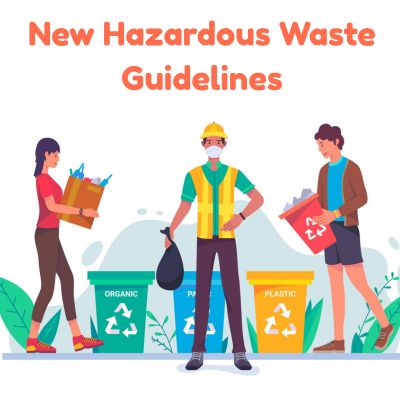
Effective handling of hazardous waste is a major challenge for industries across India. To ensure environmental protection and public health, the Ministry of Environment, Forest and Climate Change (MoEFCC) has introduced updated Hazardous Waste Management Rules 2025. These rules are designed to strengthen compliance, promote safe disposal practices, and encourage recycling of hazardous waste.
In this blog, we’ll walk you through the key updates, compliance requirements, and the impact of Hazardous Waste Management Rules 2025 in India.
Hazardous Waste Management refers to the systematic collection, treatment, recycling, and disposal of waste that poses a risk to human health or the environment. This includes waste containing toxic chemicals, flammable substances, heavy metals, biomedical waste, and e-waste. Proper management ensures industries remain compliant with laws while reducing environmental risks.
1. Stricter Classification of Waste
The new rules have expanded the list of hazardous waste categories. Industries now need to identify and classify waste streams more accurately before storage or disposal.
2. Mandatory Digital Tracking
To improve transparency, waste generators, transporters, and disposal facilities must use a digital tracking system for hazardous waste movement. This will reduce illegal dumping and ensure accountability.
3. Extended Producer Responsibility (EPR)
Producers and importers are now accountable for post-consumer waste collection and treatment. EPR has been strengthened to include more product categories such as chemicals, paints, batteries, and electronics.
4. Recycling and Co-processing Incentives
Industries that adopt hazardous waste recycling technologies or use waste as an alternative fuel/raw material (co-processing) will receive compliance benefits and tax incentives.
5. Tighter Penalties for Non-Compliance
The Hazardous Waste Management Rules 2025 introduce higher fines and stricter legal action for industries violating waste disposal norms. This move is expected to improve compliance rates significantly.
Every business dealing with hazardous waste must obtain authorization from the State Pollution Control Board (SPCB) or Pollution Control Committee (PCC).
This authorization is mandatory before handling, storing, transporting, or disposing of hazardous waste.
The application process is simple but requires accuracy:
Once approved, you’ll receive a certificate that allows you to manage hazardous waste legally.
1. Conduct regular hazardous waste audits.
2. Maintain digital records of generation, transport, and disposal.
3. Partner with authorized hazardous waste management facilities.
4. Train employees on safe handling and segregation.
5. Monitor updates from CPCB (Central Pollution Control Board) and State Pollution Boards.
The Hazardous Waste Management Rules 2025 in India mark a significant step toward sustainable industrial growth. By enforcing stricter compliance, promoting recycling, and holding producers accountable, the government aims to minimize the environmental impact of hazardous waste.
Industries that proactively adapt to these changes will not only remain compliant but also build a reputation as environmentally responsible businesses.
To learn more about hazardous waste management in any State in India, we recommend you to visit Metacorp as it solves legal and compliance issues of new and established businesses.





We are the pioneers in offering environmental consulting services to our patrons, giving us the first mover advantage & keeping us ahead of our competitors.
Very experienced in filing, monitoring & submission of CDSCO Compliances, Drugs Manufacturing & sale guidelines, Environmental Impact Assessment, AERB consulting services, Pollution Control Board CTE & CTO Advisory Services, Waste Management Authorization from State Pollution Control Boards, Fertilizers & Insecticides Manufacturing, Wholesale & Import Compliances
